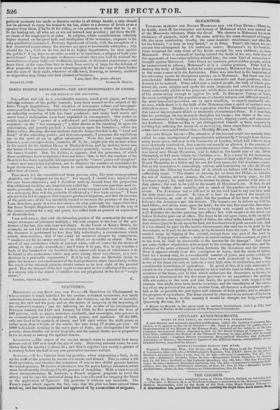INNER TEMPLE REGULATIONS—TIIE ANTI-MONOPOLISTS IN ERROR.
TO TI1E EDITOR TIIE SPECTATOR, SI11,—Pens and ink to a considerable amount, much good paper, and many , valnabIe columns of the public journals, have been wasted on the subject of the Inner Temple Regulations. The attention of newspaper editors and newspaper
1 . correspondents has been directed to the "vexatious proceedings" of the Benchers ; ' an unhealthy secretion of bile has been produced ; and many bard words and much holiest indignation have been expended in consequence, One writer in- veighs against the " power of a self-elected and irresponsible body ;" another expatiates on the " bar monopoly ; " a third alludes to the breaking in upon the constitution, and gravely predicts a breaking in upon the Benchers ; whilst the Editor of time itioruiny Journal declares that Sir James Scarlett is the " head and front" of the offending parties, and that consequently, I presume, the regulations are in the spirit of an ex officio information. Were this last conjecture well / founded, your correspondents, Aristides, IV S., &c., might join the zealous editor I: in his search for the Golden Fleece at Hurley-bottom, and by striking terror into
.. the hearts of the members of the Administration generally, secure the downfal of ' Sir James Scarlett. But, Mr. Editor, it appears, that the grievance of whiel these gentlemen have complained does nut exist ; that, in fact, the conduct of the . Benchers has been a palpable infringement upon the "canon 'gainstself-slaughter" —their new laws being calculated, not to diminish the number of candidates for legal distinctions, but to induce then, to seek admission to the bar through the other Inns of Court.
Thus much for the consolation of those persons who, like your correspondent Aristides, are " designed for the bar." For myself, I should have rejoiced had the case been otherwise ; and I therefore entirely dissent front the proposition that additional facilities are imperatively called for. Graviora quallam sant re- media perieulis ; and, in this case, I would rather contend with the existing evils of a monopoly, than risk the probable ill effects of a " free trade system." I have
I. always been led to suppose that lawyers produced litigation, and that the increase t of the professors of the law inevitably tended to increase the practice of the Jaw; lain, therefore, quite at a loss to conceive on what principle the supposition that the inner Temple Regulations were calculated to throw difficulties in the way of the young aspirant for a wig and gown, lots called forth so general an expression i of dissatisfaction.
3 I am well aware, that with the labouring portion of the community the rate of
P' wages decreases as labourers multiply ; but with respect to the fees of the gen- tlemen of the bar, this rule does not obtain. In the Court of King's Bench, for example, we are told that there are already nearly four hundred barristers, whilst the business is performed by less than fifty individuals; a circumstance which clearly demonstrates, that if law could be rendered cheaper by competition, " numbers are by no means wanting" to effect so desirable an object. The re- moval of any restrictions which at present exist, will of course be the means of 1 adding to this goodly assemblage; and I leave it to you, Sir, to say whether a
' body of five hundred or six hundred idlers, whose only hope of subsistence is to
• be found in the contentions which may arise among their neighbours, is a desi- deratum in a peaceable community ? If it be not, then TIO 'Quixotic desire to
I place the honours and emoltunents of the legal profession more immediately within the reach of the talented plebeian should induce us to lose sight of the general : good. That the interest of the few ought to succumb to the wellbeing of the mnany,


















 Previous page
Previous page